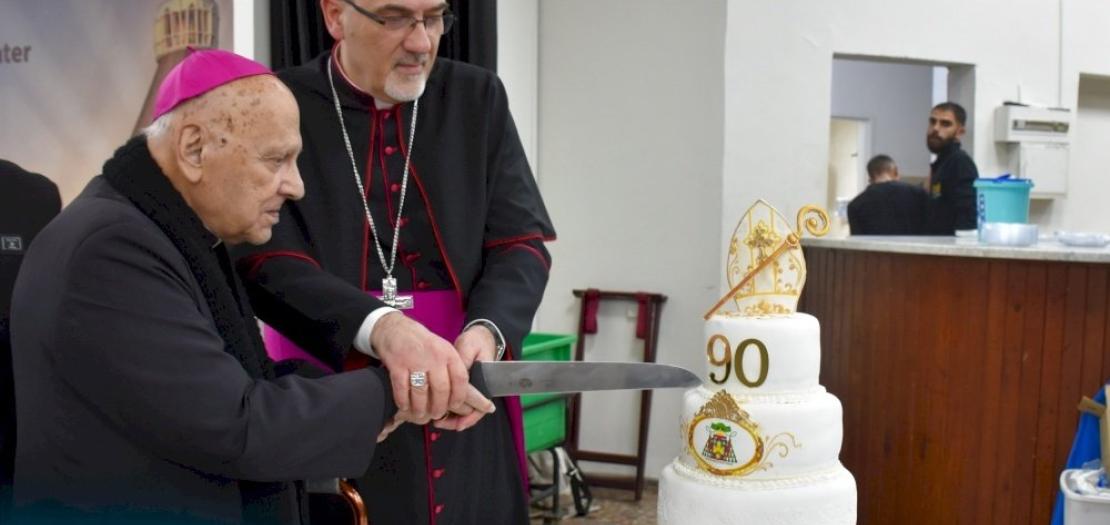Issued by the Catholic Center for Studies and Media - Jordan. Editor-in-chief Fr. Rif'at Bader - موقع أبونا abouna.org
Sabbah: A nonagenarian patriarch of the people
I write these words as Patriarch Michel Sabbah marks his nonagenarian long life. He is the one who holds the title of "Patriarch of Jerusalem," but the Palestinian people rightfully call him "the Patriarch of the People".
Patriarch Michel Sabbah was born in Nazareth of Galilee on March 19, 1933. He became a priest of the Latin Patriarchate since 1955. He served in several parishes during which he was distinguished by composure, wisdom, spirituality, and openness. Among his most prominent pastoral tasks is "the Church of Jesus the King" in Al-Misdar, downtown Amman ( 1971-1987) where he supervised two schools, namely the one in Al-Misdar for girls and the other in Ashrafieh for boys, in addition to his spiritual service at one of the largest and oldest churches in Amman which the Latin Patriarchate built in 1924.
As for his academic education, his most notable one is the doctorate degree in Arabic philology from the Sorbonne University. After obtaining a bachelor's degree in philosophy and theology from the Latin Patriarchal Seminary of Beit Jala, he continued his studies of Arabic language at the Jesuit University in Beirut, and during the years 1968 to 1975 he taught Arabic and Islamic studies at the diocese of Djibouti. Later, he became president of Bethlehem University, which was established by the Latin Patriarchate of Jerusalem following the visit of Pope Paul VI in 1964, as it will mark golden jubilee this year.
The resounding and joyful surprise was in December 28, 1987 when the Vatican announced that Pope John Paul II had named the parish priest of Al-Misdar as patriarch of the Holy City, to become the first Arab patriarch of the Latin Church. The circumstances surrounding his appointment as patriarch were very suitable as it coincided with the first popular uprising that erupted in all parts of Palestine. His nomination served as support for the rights of a people whose land is still occupied, and who are still bereft of the most basic rights and freedoms.
Patriarch Sabbah set out his mission amidst the storms that wreak havoc in every respect and began the stage of administrative and pastoral organization of all parts of his diocese which extends in Palestine, Jordan, and the island of Cyprus. He opened up contacts with all the Churches of the East, the Catholic Church in the first place, by firmly contributing to the establishment of the Council of Catholic Patriarchs of the East--keeping by his side educated priest Fr. Rafiq Khoury who has turned 80 years old--and contributing to the formulation of the first six Pastoral Letters of the Patriarchs of the East, as the prominent one is the second spontaneous letter titled, "The Church in the East is communion and testimony." He also opened up contacts with the sisterly churches through the efficient introduction of the Latin Patriarchate in the Council of Catholic Patriarchs of the East, which marks its 50th anniversary next year, and contributed to the development of priests' knowledge. During his term, the educational standard of priests was enhanced and they were dispatched to be enrolled in theological studies and canon law in the Pontifical universities in Rome. He also welcomed Pope John Paul II in 2000, thus concluding the synod of the Catholic Church in the Holy Land.
Sabbah was characterized by his free speech in Palestine and abroad. He was well-known for his brevity, clear and frank expressions. Consequently, even after his retirement based on age and up to this moment, he has formed a free Arab, Christian, and Palestinian voice, supportive of humanity, and calling on others to remember that God is one, and that the Almighty loves everyone and calls on everyone to enjoy true brotherhood.
Sabbah never despaired that a new dawn awaits the city of Jerusalem, dear to his heart, where he chose to reside since his retirement in 2008, so he established "Kairos Palestine" (A moment of truth: A word of faith, hope, and love from the heart of Palestinian suffering) and conveyed its gist to the entire world. He was referred to by the entire Palestinian people as the "the patriarch of the people". He looks out from his window in the Mount of Olives every morning at the City of Peace, and prays imploring the Almighty God "to send in the Holy Land, especially among its rulers, new hearts, new minds, and new visions that see God and man, and then see the lost peace, so they know that safety is found only in the hearts of people, not in fighting them.”
The Latin Patriarchate honored him by holding a church and popular celebration in Nazareth on his 90th birthday anniversary. Personally speaking, I am proud that he taught me and guided me as a priest for my church in Al-Misdar, as he was the one who ordained me a priest there on June 29, 1995. I do not forget the words he said to me that day in the homily which I consider as a guide on the way: “The society to which you are sent today needs unity and love at all levels: The inter-Christian community: in the same parish and in the same diocese, and among the various churches with their different rites as well as the ecclesiastical and civil entities. The fields of serving love, ecumenical service, and interfaith dialogue are among the priorities of the mission today, even if it seems to you sometimes, or several times, that things are moving in this direction they are certainly against the current.”
O nonagenarian patriarch, may God protect you and may God extend your life to see the dawn of the centenary, God willing.







